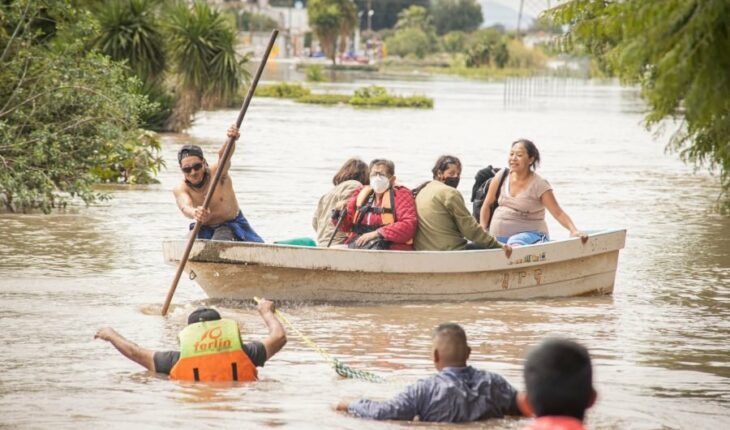In November 2021, Mexico closed its participation in the United Nations Conference on Climate Change (COP26) by asking the international community to include in the negotiations on climate change a human rights approach and vindication of indigenous peoples, but, almost a year after that positioning, it still does not attend to the victims of forced displacement due to climate change.
In fact, it has not been able to generate information on this phenomenon that already affects several regions of the world, mainly in Central America, where the World Bank projects that, by 2050, 4 million people will be displaced by the effects of the climate crisis in this region, including Mexico.
How many displaced people are there in Mexico, how many people are at risk?
Although in Mexico there is no official estimate of people displaced by the effects of climate change, nor any legal instrument to serve this population, the Internal Displacement Monitoring Center (IDMC) states that, in 2020 alone, there were 101,000 forced displacements in Mexico caused by natural disasters, this is 10 times more migrations than those caused by violence that year.
The phenomena of greatest risk for those living in Mexico are floods, droughts and hurricanes; Inhabitants of the poorest regions are the most vulnerable.
Floods, landslides and damage to health
In Mexico, there are 24 million people vulnerable to flooding, according to the National Atlas of Vulnerability to Climate Change (ANVCC); these phenomena are the leading cause of damage when it comes to natural disasters.
Data from the National Center for Disaster Prevention (Cenapred) show that, of the total losses reported due to extreme events, 62% corresponded to rains and floods, an equivalent to 10,678 million pesos.
Floods not only involve water everywhere, but also associated problems such as landslides in areas of risk or health impacts, such as the spread of dengue.
Landslides are not a minor consequence. In Mexico, they have claimed hundreds of human lives, especially in the states of Baja California, Chiapas, Colima, Guerrero, Jalisco, Michoacán, Oaxaca, Puebla and Veracruz.
The National Climate Change Strategy itself estimates that there are currently 4 million people at risk from landslides in 283 municipalities of the country.
As for dengue, in about 60% of the country there are climatic conditions that help its proliferation, so there is a public health risk due to the transmission of diseases in these areas of the country.
Over the past 10 years, dengue has spread more in rural regions, especially in indigenous populations, according to the risk atlas itself.
Currently, about 27 million inhabitants in less developed municipalities are at risk of internal displacement due to the climate crisis in our country, inside the next 20 and 30 years, according to researcher Alethia Fernández de la Reguera, from the Institute of Legal Research (IIJ) of the UNAM.
It is a risk scale involving 480 highly vulnerable and 880 moderately vulnerable municipalities.
Since 2000, federal authorities have issued 2,417 declarations of all kinds: disaster, emergency and weather contingency.
92% has been due to hydrometeorological phenomena, which includes, among others, cyclones, hurricanes, hailstorms, frosts, floods, rains, storms, droughts and extreme temperatures; 1.53% has been due to fires and only 40 cases due to landslides and subsidence.
To achieve its emission reduction goals towards 2030, Mexico contemplated for the first time the phenomenon of forced displacement in 2020, updating its commitment made in the Paris Agreement, with the aim of identifying and addressing the forced displacement of people due to the negative impacts of climate change.
However, specialists such as environmental law researcher Armelle Gouritin point out that, although a step was taken to recognize the problem, it is not enough, since it does not contemplate other factors such as environmental degradation or sea level rise in Mexico, a phenomenon that is already impacting residents of coastal strips.
Political Animal He even documented how this phenomenon is already impacting 10 of 17 municipalities in the state of Tabasco, where 70% of the state’s population lives.
Betting on fossil fuel
Far from the approach made by Mexico in Glasgow, Scotland, where the Mexican government called for “inclusive and fair climate action”, applying a perspective of human rights, gender equality and inclusion to indigenous peoples, has undertaken megaprojects without environmental permits, with effects on ecosystems and that have ignored the protests of communities involved.
In addition to reaffirming the same commitments made since 2015, the government of Mexico has done little to reduce the use of fuel oil in electricity generation, even strengthening it with the creation of a new refinery, the subsidy to fossil fuels and the attempt at reforms that benefit this energy model.
The Mexican government pushed for changes to the Electric Industry Law, which prioritize fossil fuel plants from the Federal Electricity Commission (CFE) and using only hydroelectric plants as a “clean energy” alternative.
It also builds the refinery in Dos Bocas, one of the government’s priority mega-projects, under the argument of strengthening “energy security”, with the aim of increasing the production of gasoline and diesel and reducing its import.
As for the construction of the Mayan Train, another of the priority mega-works in the southeast of the country, the government entered into a complex legal battle with inhabitants, academics and environmentalists, for the progress of works without having the environmental permits required by law.
The government has indicated that the majority of the indigenous populations involved in the project agree with the work, without having carried out the indigenous consultation process with all the communities. In addition, an area of 1 million 093 thousand 118 square meters was expropriated for the construction of Section 5 of the train.
In fact, President Andrés Manuel López Obrador has made public his intention to disappear the National Institute of Ecology and Climate Change (INECC), noting that its functions can be adopted by the Ministry of Environment and Natural Resources (Semarnat) and that it is an issue where “there is a lot of hypocrisy.”
What we do at Animal Político requires professional journalists, teamwork, dialogue with readers and something very important: independence. You can help us keep going. Be part of the team.
Subscribe to Animal Político, receive benefits and support free journalism.#YoSoyAnimal





